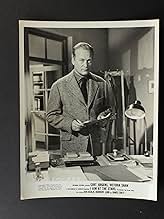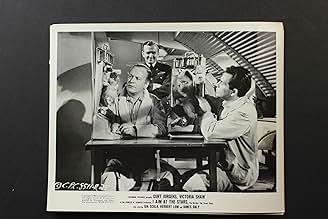NOTE IMDb
6,2/10
301
MA NOTE
Ajouter une intrigue dans votre langueThe story of rocket scientist Dr. Werner von Braun's career, from the 1920s until the late 1950s.The story of rocket scientist Dr. Werner von Braun's career, from the 1920s until the late 1950s.The story of rocket scientist Dr. Werner von Braun's career, from the 1920s until the late 1950s.
- Réalisation
- Scénario
- Casting principal
Don Burnett
- Newspaper Reporter
- (non crédité)
Paul Carpenter
- Launch Countdown Coordinator
- (non crédité)
Arpad Diener
- Horst
- (non crédité)
Avis à la une
The quip I've heard was "I Aim at the Stars -- but I hit Antwerp and London". More V-2's were targeted at Antwerp than London, it being a major port used by the Allies during the invasion of Europe.
Von Braun's relation with the Nazis was Faustian -- he was obsessed with space travel, and developing liquid-fueled rockets was a first step. The V-2 (A-4 was the military's designation) was actually counterproductive to the Nazi war effort, and von Braun no doubt realized that (as Hitler did not). It was not a practical weapon, being expensive to produce and burdensome to launch. Few actually reached their targets; more tonnage was delivered by one Allied air raid than all the V-2's carried.
Von Braun's relation with the Nazis was Faustian -- he was obsessed with space travel, and developing liquid-fueled rockets was a first step. The V-2 (A-4 was the military's designation) was actually counterproductive to the Nazi war effort, and von Braun no doubt realized that (as Hitler did not). It was not a practical weapon, being expensive to produce and burdensome to launch. Few actually reached their targets; more tonnage was delivered by one Allied air raid than all the V-2's carried.
This movie describes the life of Wernher Von Braun very well. It also gives relevant historical background on man's early forays into space. It is a good movie for anyone who is interested in the development of the science of rocketry because this man was highly instrumental in developing the Saturn V booster which took man to the moon in the late 1960s. I have been trying to find a VHS version of this movie without success so if anyone knows of where I might obtain it your suggestions would be appreciated.
This very interesting biopic of Werner von Braun was unfortunately badly received at the time of its release. Americans weren't happy when the brilliant scientist found sanctuary and a new home in America after WWII, and they weren't happy that Hollywood made a movie about him without making him out to be a villain. In fact, in England, rioters cruelly scribbled on promotional posters, "I Aim at the Stars, but Sometimes I Hit London."
If you know the life story of von Braun, chances are you followed the space race and will be very anxious to rent this movie. If you're not interested in space at all, you might need a little more to the story - and thankfully, it has more. Friendship conflicts, betrayal, romance that makes you wait, secrets, rebellion, and all under the cloud of Nazi Germany. It really is an interesting story, and with Curd Jurgens at the helm, you can rest assured you're going to see some fine acting. It's not his usual character, since he usually played either soldiers or ladies' men. He's a scientist who thinks of rockets and the stars more than anything - including politics and women. He may have strength, but he puts his usual swagger on the shelf and embodies a different role; after all, that's called acting.
Herbert Lom is also very good, playing Curd's friend and colleague with a different idea of patriotism. There are a couple of women in the cast, even though they're not the focus: Victoria Shaw and Gia Scala, as their love interests. James Daly plays a good villain, making you grit your teeth and root for Curd all the more. I enjoyed this movie, and I'm not interested in space in the slightest!
Herbert Lom is also very good, playing Curd's friend and colleague with a different idea of patriotism. There are a couple of women in the cast, even though they're not the focus: Victoria Shaw and Gia Scala, as their love interests. James Daly plays a good villain, making you grit your teeth and root for Curd all the more. I enjoyed this movie, and I'm not interested in space in the slightest!
A passe hagiography of the life of Werner von Braun, a great rocket engineer with a questionable past. It's original title was "I Aim For the Stars." The best line I ever heard about this film was: "I aim for the stars, but sometimes I hit London."
"I Aim at the Stars" purports to be the story of Werner von Braun, one of the men responsible for getting the U.S. into space. In many ways, it is, but like many geniuses, von Braun lived a life full of controversy. To the film's credit, that controversy is somewhat handled here, though not enough.
The film covers von Braun's obsession with space travel, his work for Germany during the war, which resulted in rockets being used as war weapons, and he and his teammates handing themselves over to the Americans after the war. One word comes to mind: collaborator, but in von Braun's case, it goes a little deeper. Some people, such as opera star Elisabeth Schwarzkopf, collaborated with the Nazis. von Braun collaborated with anybody who could help him further his work. When that was no longer Germany, he was out of there.
It's foolish to go into all the aspects of von Braun not covered in the film. There are many more objective accounts of his life and work with the Nazis and whether or not he had to join or was a devoted member of the party. Curt Jurgens does an excellent job as von Braun, depicting him as a strong and determined man dedicated to his work first, last, and always.
The beautiful Victoria Shaw has a small role as his wife, Maria; James Daly plays an American soldier violently opposed to von Braun working for the U.S. Herbert Lom plays a member of von Braun's team who refuses to go to America, and he's very good.
There is some great rocket footage; many of the scenes in the film are short, almost like television scenes. It's not a big-budget movie. There is a love story subplot between a spy and one of von Braun's team; in fact, there was a spy, a female dentist, who reported some of his negative comments to the Nazis.
Werner von Braun was an individual of great accomplishments who helped the U.S. win the war in space. In the film, he is depicted as a reluctant Nazi, and it's true that he was, in fact, arrested by the Nazis for saying things against the party privately. In the end he was an opportunist and a survivor who did what had to be done to achieve his goals. Like many biographies, this film is merely one view. As to his efforts to get into space and instead making war weapons, there's always the joke about the movie: "I aim at the stars, but sometimes I hit London."
The film covers von Braun's obsession with space travel, his work for Germany during the war, which resulted in rockets being used as war weapons, and he and his teammates handing themselves over to the Americans after the war. One word comes to mind: collaborator, but in von Braun's case, it goes a little deeper. Some people, such as opera star Elisabeth Schwarzkopf, collaborated with the Nazis. von Braun collaborated with anybody who could help him further his work. When that was no longer Germany, he was out of there.
It's foolish to go into all the aspects of von Braun not covered in the film. There are many more objective accounts of his life and work with the Nazis and whether or not he had to join or was a devoted member of the party. Curt Jurgens does an excellent job as von Braun, depicting him as a strong and determined man dedicated to his work first, last, and always.
The beautiful Victoria Shaw has a small role as his wife, Maria; James Daly plays an American soldier violently opposed to von Braun working for the U.S. Herbert Lom plays a member of von Braun's team who refuses to go to America, and he's very good.
There is some great rocket footage; many of the scenes in the film are short, almost like television scenes. It's not a big-budget movie. There is a love story subplot between a spy and one of von Braun's team; in fact, there was a spy, a female dentist, who reported some of his negative comments to the Nazis.
Werner von Braun was an individual of great accomplishments who helped the U.S. win the war in space. In the film, he is depicted as a reluctant Nazi, and it's true that he was, in fact, arrested by the Nazis for saying things against the party privately. In the end he was an opportunist and a survivor who did what had to be done to achieve his goals. Like many biographies, this film is merely one view. As to his efforts to get into space and instead making war weapons, there's always the joke about the movie: "I aim at the stars, but sometimes I hit London."
Le saviez-vous
- AnecdotesAccording to the American Film Institute: "The film was greeted with demonstrations against von Braun at showings in Europe and New York, according to various news stories. Prior to the world premiere in Munich, von Braun and Jurgens held a press conference during which members of the Communist and British press hounded von Braun with charges that the film whitewashed his war work. The press conference prompted von Braun to issue the following statement: 'I have very deep and sincere regrets for the victims of the V-2 rockets, but there were victims on both sides. A war is a war, and when my country is at war, my duty is to help win that war.' Later, a crowd of protesters mobbed the theater where the premiere was held. Demonstrators in London dropped anti-Nazi pamphlets onto theatergoers from a balcony. In New York, the film was picketed by an anti-Fascist youth organization. The film was previewed in Washington at the Senate Office auditorium, and its Oct 1960 opening in Washington was attended by First Lady Mamie Eisenhower and the chairman of the Joint Chiefs of Staff. The film was chosen to open the Edinburgh Film Festival, where it received a special diploma of merit."
- GaffesDuring the Allied bombing raid on Peenemünde, dive-bombers are heard. No such aircraft would have been used.
Meilleurs choix
Connectez-vous pour évaluer et suivre la liste de favoris afin de recevoir des recommandations personnalisées
- How long is I Aim at the Stars?Alimenté par Alexa
Détails
- Date de sortie
- Pays d’origine
- Langues
- Aussi connu sous le nom de
- I Aim at the Stars
- Lieux de tournage
- Sociétés de production
- Voir plus de crédits d'entreprise sur IMDbPro
- Durée1 heure 46 minutes
- Couleur
- Rapport de forme
- 1.85 : 1
Contribuer à cette page
Suggérer une modification ou ajouter du contenu manquant

Lacune principale
By what name was L'Homme des fusées secrètes (1960) officially released in India in English?
Répondre
































